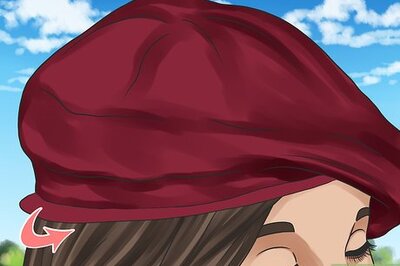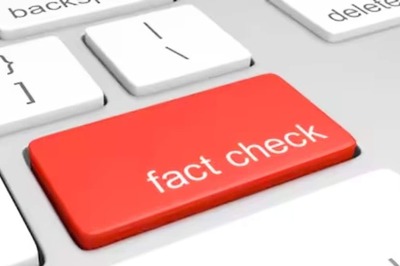
views
- Blessings are magical abilities or enhancements given to characters when they earn a god’s favor. They last indefinitely but can be revoked by the gods as well.
- The DM decides when players earn a blessing. This might happen after slaying a legendary monster, defeating the enemy of a god, or completing a heroic quest.
- Example blessings include the Blessing of Understanding (which raises a PC’s Wisdom by +2) or the Blessing of Health (which gives a +2 bonus to Constitution).
What are blessings in D&D 5e?

Blessings are divine favors bestowed by the gods and their servants. In D&D 5e, a blessing is a type of supernatural gift. If a player character (PC) catches the attention of the gods themselves in a D&D campaign, you (if you’re a DM) can reward them with a blessing—typically an ability or enhancement that’s useful in some way. Blessings can give player characters an edge in battle, make them stronger, and even protect them from harm. Keep in mind that blessings are rare. In-game, they’re only given by gods (or celestial servants of the gods like angels and archons). Blessings can last forever—but if your PC angers the god that gave them a blessing, it might also be taken away. If you’re a player, you typically can’t decide to give your character a blessing. The DM is responsible for giving blessings when they feel you’ve earned them. Blessings can also be fantastic narrative tools. They connect gods and mortals, giving PCs more complex character arcs and making quests more impactful.
Types of Blessing

Blessing of Understanding This blessing increases a character’s Wisdom score by 2, to a maximum of 22. In 5e, Wisdom measures a character’s practical intelligence and ability to perceive things in the world around them. So, if you’re looking to give a PC a mental boost, consider the Blessing of Understanding for them. Normally, it’s only possible to increase an ability score (like Wisdom) up to 20—but this blessing specifically makes it possible to raise to 22!

Blessing of Health The Blessing of Health increases a character’s Constitution score by 2, to a maximum of 22. Constitution measures a character’s fitness, vitality, and ability to withstand harmful effects like poison, disease, and exhaustion. That’s why the Blessing of Health is so useful—it makes characters more resilient and able to soak up more damage in combat without falling unconscious! Like the Blessing of Understanding, this blessing allows you to raise a character’s Constitution higher than would normally be possible (since 20 is the usual maximum).

Blessing of Protection The Blessing of Protection gives characters a +1 bonus to their armor class and saving throws. In D&D, a PC’s armor class measures their defenses (and determines how difficult it is to hit them in combat). Meanwhile, a PC’s saving throw bonus measures their ability to avoid harmful magic. Thus, a +1 bonus from this blessing serves as protection against both physical attacks and spells.

Blessing of Magic Resistance This blessing gives characters advantage on saving throws against spells and magical effects. Basically, whenever an enemy spellcaster targets a character with this blessing and casts a spell that would force them to make a saving throw, there’s a greater chance of a blessed character succeeding on their saving throw. For example, the Fireball spell forces targeted creatures to make a Dexterity saving throw, and if they fail, they take full damage from the spell—but the Blessing of Magic resistance can grant advantage on that Dexterity saving throw. In D&D, “advantage” means you can roll 2d20 (20-sided dice) and take the higher result when calculating a saving throw, thus improving your chances of success.

Blessing of Valhalla This blessing grants the same powers as a character using the Silver Horn of Valhalla (a magic item in the game). With the Blessing of Valhalla, PCs can summon 2d4 + 2 spirit warriors from the plane of Ysgard to appear nearby and help them in battle. These spirit warriors have the same stats as berserkers (in the Monster Manual) and disappear after 1 hour (or when the character drops to 0 hit points). Keep in mind that this blessing has restrictions! After using it, you can’t use it again for 7 days in-game.

Blessing of Weapon Enhancement The Blessing of Weapon Enhancement turns a single nonmagical weapon into a +1 weapon whenever the blessed character wields it. Weapons with a +1 enhancement essentially give wielders a +1 bonus to attack rolls and damage rolls while they hold the weapon, allowing characters to deal a little extra damage (and have a slightly higher chance of hitting enemies).

Blessing of Wound Closure The Blessing of Wound Closure grants the same benefits as a Periapt of Wound Closure, which is a magic item characters can find and equip in the game. Characters with this blessing stabilize at the start of their turn whenever they’re unconscious and dying—and when you roll a Hit Die for a character to replenish their hit points, you can double the number of hit points restored. Characters who are dying have to make death saving throws—and if they fail 3 death saves, they die. The Blessing of Wound closure essentially prevents characters from dying this way by stabilizing them, which negates the need for death saves, You can roll Hit Die for your character during short rests and replenish some of their hit points (if your character has taken damage). This blessing simply makes rolling Hit Die more effective!
How to Earn Blessings

PCs can earn blessings through heroic feats or gaining a god’s approval. According to the rules in 5e’s Dungeon Masters Guide, there’s no set way for characters to earn blessings. Rather, they can receive blessings at the DM’s discretion—usually for noteworthy feats like helping a god’s favored servant complete an important task, restoring a god’s sacred shrine, or defeating a god’s bitter rival and thwarting their plans. Other ways to earn blessings could include: Swearing fealty to a deity. If your character pledges their faith and loyalty to a particular god (of which there are many in D&D), they might be rewarded with a blessing. Completing an epic quest. Not every quest in D&D is monumental—but if your PC ends up saving the world, killing a legendary beast, or recovering a lost artifact, a grateful god might reward them. Acts of sacrifice. If your character does something really selfless for the sake of the greater good, a good-aligned deity might find them worthy of a blessing. Divine intervention. If you’re the DM, you don’t have to wait for players to earn a blessing. Instead, a god could give the PCs blessings in order to prepare them for an important mission or introduce them to the next big plot point!
Homebrew Blessings

Dungeon Masters are free to create their own custom blessings for PCs. If you’re a Dungeon Master hoping to use blessings in your D&D campaign, keep in mind that you don’t necessarily have to use the ones above. There are only 7 blessings mentioned in the Dungeon Master’s Guide—but if none of them catch your eye, try “homebrewing” and create your own instead. Come up with blessings that you feel would suit your PCs and their skill sets! For example: Give a ranger PC a “Blessing of the Hunt,” allowing them to cast Hunter’s Mark without a spell slot. Give a Charisma-based spellcaster (like a bard, sorcerer, or warlock) a “Blessing of Leadership” and increase their Charisma ability score by 2. Give any character a “Blessing of Wild Speech,” granting them the permanent effects of the Speak with Animals spell. Give any character a “Blessing of Courage,” making them immune to the Frightened condition and fear-based abilities.
Blessings vs. Charms

Charms are minor magical gifts that can be obtained in a variety of ways. The Dungeon Master’s Guide also mentions charms; though they’re similar to blessings, the magical effects from charms are usually a little less powerful than blessings. Furthermore, charms don’t come from deities; they might come from a lot of different sources (a benevolent dragon, a fey lord, or solving a sphinx’s riddle, for example). They also tend to be more limited; some can only be used once, and others can be used a handful of times. Examples of charms include: Charm of Animal Conjuring. This charm lets you cast the Animal Conjuring spell at 3rd level. After 3 uses, the charm disappears. Charm of Darkvision. This charm lets you cast the Darkvision spell 3 times before disappearing. Charm of Restoration. This charm has 6 charges; you can use them to cast Greater Restoration (4 charges) or Lesser Restoration (2 charges). Once all charges are used, the charm disappears. Charm of Vitality. This charm gives the same effects as a potion of vitality (removes all exhaustion, disease, and poison, and grants the maximum number of hit points for Hit Die rolls for 24 hours). Once used, it disappears.




















Comments
0 comment